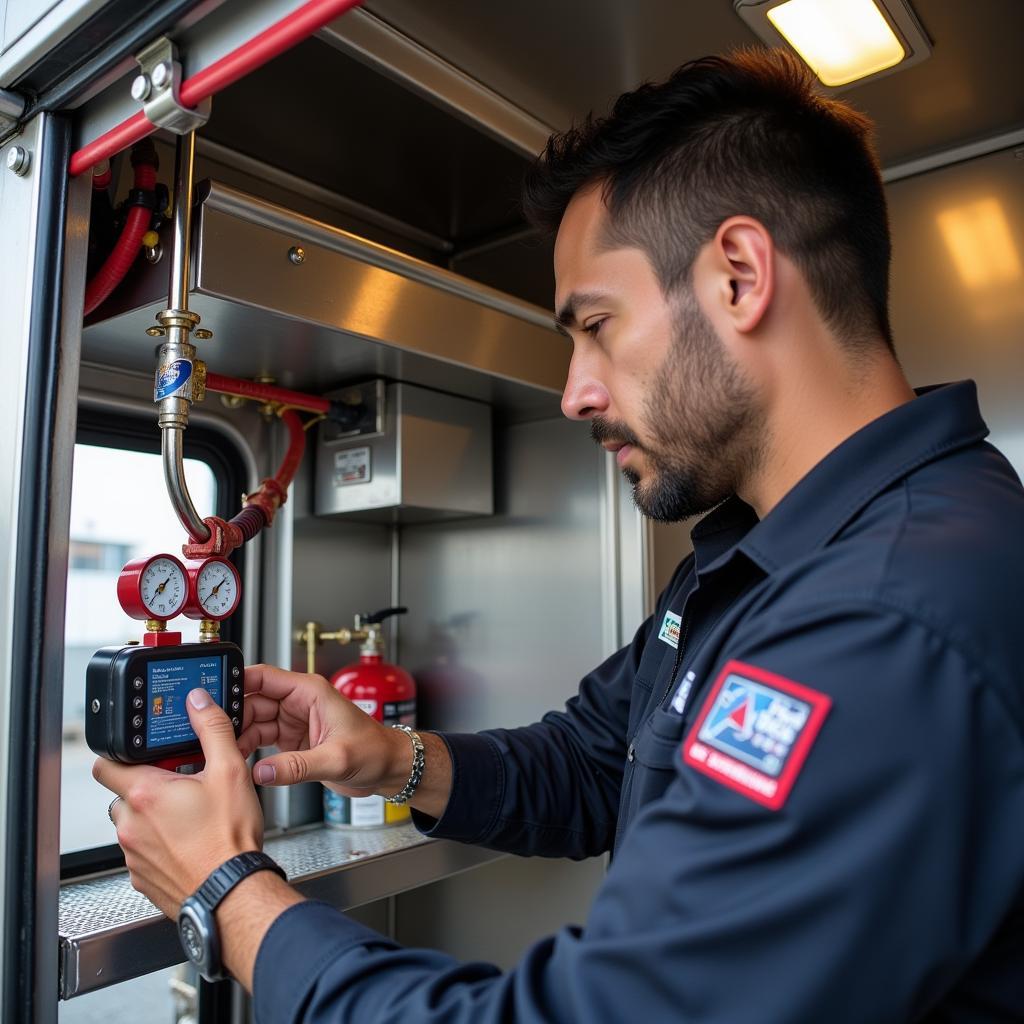A Food Trailer Fire Suppression System is a crucial investment for any mobile food business. It’s not just about protecting your livelihood; it’s about safeguarding your staff, customers, and the surrounding environment. This guide delves into everything you need to know about food trailer fire suppression systems, from understanding their importance to selecting the right one for your specific needs. fire suppression system for food trailer
Why is a Food Trailer Fire Suppression System Essential?
Mobile kitchens, with their compact spaces and the presence of flammable cooking oils and gases, are inherently vulnerable to fire hazards. A fire suppression system acts as the first line of defense, quickly extinguishing flames and preventing a small incident from escalating into a catastrophic disaster. It’s peace of mind, bottled.
Protecting Your Investment and Livelihood
Imagine years of hard work and investment going up in smoke. A fire can decimate your food trailer, equipment, and inventory, leading to substantial financial losses and potentially putting you out of business. A properly installed and maintained food trailer fire suppression system can significantly mitigate these risks, safeguarding your investment and securing your future.
Choosing the Right Fire Suppression System
There isn’t a one-size-fits-all solution when it comes to fire suppression systems. The ideal system for your food trailer depends on various factors, including the size of your kitchen, the type of cooking equipment you use, and the specific hazards present.
Different Types of Systems
- Wet Chemical Systems: These are the most common type of system used in food trailers, utilizing a potassium acetate-based agent to suppress grease fires.
- Dry Chemical Systems: These systems use a powder-based agent and are typically more suitable for fires involving flammable liquids or electrical equipment.
- CO2 Systems: These systems extinguish fires by displacing oxygen but are generally not recommended for food trailers due to the risk of suffocation in enclosed spaces.
Key Features to Consider
- Automatic Activation: The system should automatically activate when a fire is detected, ensuring rapid response even if you’re not present.
- Manual Activation: A manual activation option provides an additional layer of safety, allowing you to trigger the system in case of a small fire that hasn’t yet triggered the automatic mechanism.
- Nozzle Placement: Proper nozzle placement is critical for effective fire suppression. Nozzles should be strategically positioned to cover all cooking areas and potential fire hazards.
Installation and Maintenance
Proper installation and regular maintenance are crucial for ensuring the effectiveness and reliability of your food trailer fire suppression system.
Professional Installation
It’s highly recommended to have your fire suppression system installed by a qualified and certified technician. This ensures that the system is installed correctly and meets all relevant codes and regulations. Don’t try to cut corners here – professional installation is a worthwhile investment. food truck fire suppression system cost
Regular Inspections and Maintenance
Regular inspections and maintenance are essential for keeping your system in optimal working condition. This typically involves annual inspections by a certified technician, as well as regular checks of the system’s pressure gauge and other components. A well-maintained system is a reliable system.
“Regular maintenance of your fire suppression system is just as crucial as having one installed in the first place,” says John Smith, Certified Fire Protection Specialist. “It’s not a ‘set it and forget it’ type of situation.”
bbq food trailer for sale near me
Regulations and Compliance
Understanding and complying with local fire safety regulations is paramount for operating a food trailer legally and safely. These regulations vary by location, so it’s essential to research the specific requirements in your area.
Local Fire Codes
Contact your local fire marshal or building department to learn about the specific fire safety regulations for food trailers in your area. This will include information on the required type of fire suppression system, installation standards, and inspection frequency.
“Don’t underestimate the importance of understanding and complying with local fire codes,” advises Maria Garcia, Fire Safety Inspector. “Ignorance is not an excuse when it comes to fire safety.”
 Food Trailer Fire Suppression System Inspection
Food Trailer Fire Suppression System Inspection
Conclusion
Investing in a food trailer fire suppression system is an essential step for any responsible food trailer owner. exhaust hood for food truck It’s a proactive measure that protects your business, your staff, your customers, and your peace of mind. By understanding the different types of systems, key features, installation and maintenance requirements, and local regulations, you can make an informed decision and choose the right system for your specific needs.
FAQs
-
How often should my fire suppression system be inspected? Annually by a certified technician.
-
What type of fire suppression system is best for a food trailer? Wet chemical systems are generally recommended.
-
Can I install the system myself? Professional installation is strongly recommended. food trailer for sale fresno
-
What triggers the automatic activation of the system? A rapid rise in temperature.
-
How do I find a certified technician for installation and inspection? Contact your local fire marshal or search online for certified fire protection companies.
-
What is the average lifespan of a fire suppression system? Around 10-15 years with proper maintenance.
-
Are there any specific cleaning procedures for the system after activation? Yes, a certified technician should clean and recharge the system after activation.
For further assistance, please contact us at Phone Number: 02437655121, Email: minacones@gmail.com, or visit our address: 3PGH+8R9, ĐT70A, thôn Trung, Bắc Từ Liêm, Hà Nội, Việt Nam. Our customer service team is available 24/7.